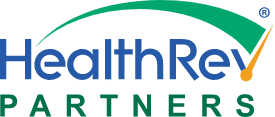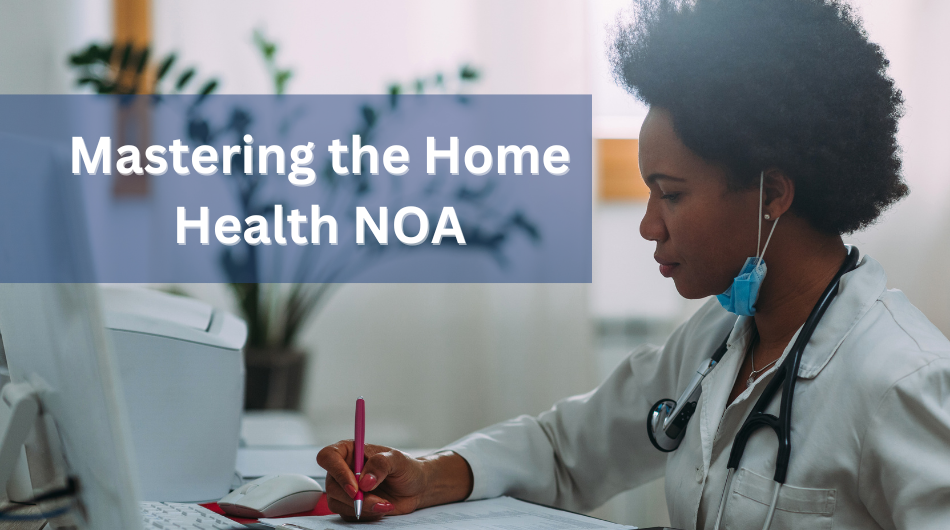This comprehensive guide dives deep into the Home Health NOA, covering everything you need to know, including:
- What the Notice of Admission (NOA) is and what it does
- Who submits the NOA and when it’s submitted
- The benefits of the NOA for both HHAs and Medicare
- Additional resources and tips for accurate and efficient NOA submission
What is a Notice of Admission (NOA)?
A Notice of Admission or NOA is a one-time notification for a series of home health periods of care (HH POCs). It is basically an extension of the no-pay RAPs, which goes back to the reduced RAPs that started back in 2020.
Only one NOA is required for a series of HH POCs. It must be submitted at the beginning of the first 30-day payment episode, within five days of the start of care. The NOA establishes the patient and remains active until a discharge is submitted for that patient. However, once a discharge is submitted to Medicare, a home health agency must submit a new NOA in order to send and receive payment for any additional claims.
Claiming Patients for Billing
Home health agencies (HHAs) need to “claim” patients to ensure proper billing. This means informing other providers that they are the primary agency for the patient, preventing duplicate claims and billing issues. Other HHAs/hospice providers should pay close attention to this when verifying insurance eligibility. Overlapping services from different providers won’t be paid for.
False NOAs Causing Billing Problems
Many HHAs face issues due to providers filing Notices of Admission (NOAs) for patients but not subsequently billing or canceling them. This leaves an “active” NOA on the patient’s record, even if they no longer require services.
To avoid billing issues with NOAs for home health services, it is important for the agency to adhere to proper patient procedures. If other providers haven’t properly billed or canceled their NOAs, you’ll need to add condition code 47 to your NOA to ensure your claims are processed.
CMS has outlined changes, in detail, to Chapter 10 of the Medicare Claims Processing Manual, including instructions for submitting Home Health NOAs instead of RAPs on and after January 1, 2022.
What is needed to submit a NOA?
The NOA can be submitted with just two pieces of information. First, you need a written or verbal doctor’s order that identifies the skills necessary for the first visit. We suggest ensuring the physician is PECOS enrolled to prevent possibility of denial on the claim. Secondly, you need to complete the first visit.
The NOA eliminates the need to submit a valid diagnosis code and HIPSS code.
What if Medicare isn’t the primary insurance?
Even if Medicare isn’t the patient’s primary insurance, we recommend that you still send a NOA. Our rule of thumb is to always submit the NOA so that it is on file with Medicare. In that case, if the payer is changed, we’ve already established care with Medicare and can release the final claim.
Note that if Medicare does become primary, best practice is to discharge the patient and readmit under Medicare to ensure compliance with Medicare guidelines.
How do I submit a NOA?
NOAs can be sent to your MAC by mail, Electronic Data Interchange (EDI), or through the Direct Data Entry (DDE) system. For more information specific to your MAC, please visit their website.
CR 12256 adds new information to Chapter 10 of the Medicare Claims Processing Manual, including detailed NOA filing procedures and amended billing instructions.
What Type of Bill (TOB) will be required?
NOAs should be sent using a TOB 32A. Use TOB 329 for Periods of Care (POCs) after you submit the NOA. According to CMS, “the National Uniform Billing Committee (NUBC) has redefined TOB 329 to represent an original claim, rather than an adjustment, for all claims with “From” dates on or after January 1st, 2022.”
What if we miss the 5-day submission deadline?
Your agency will need to manually enter the NOA into the DDE system when you notice that the NOA is not on file with Medicare. If you do not submit your NOA within 5 calendar days of the commencement of care, a payment reduction equal to 1/30th of the full amount will be automatically deducted. If the NOA is still not submitted by the sixth day of admission, the penalty will increase to 6/30th. If 30 days past due, the penalty will be applied to the initial period of care and the ongoing 30-day periods of care until the NOA has been accepted.
Can I file an exception request if I miss the 5-day submission deadline?
Yes, the exception will be added on the final claim as a conditional request. However, late NOA submission does not automatically approve you for an exception. There must be a valid reason the exception is being requested based on Medicare late submission criteria. If you fail to timely file the NOA, you may request an exception. If approved, the late submission fee will be waived. The four circumstances that may qualify for an exception are listed on these manual instructions.
If you fail to send the NOA timely, you may request an exception, which, if approved, waives the consequences of late filing. The 4 circumstances that may qualify for an exception are:
- Fires, floods, earthquakes, or other unusual events that inflict extensive damage to the HHA’s ability to operate
- An event that produces a data filing problem due to a CMS or MAC systems issue that is beyond your control
- You are a newly Medicare-certified HHA that is notified of that certification after the Medicare certification date, or which is awaiting its user ID from its MAC
- Other circumstances that we or your MAC determines to be beyond your control
Additional Resources and Tips
To ensure accurate and efficient NOA submission, HHAs can access valuable resources and follow these helpful tips:
- CMS Home Health NOA Overview: This official document provides comprehensive information about the NOA, including its purpose, requirements, and submission process.
- Palmetto GBA NOA FAQs: This frequently asked questions document addresses common concerns and clarifications regarding the NOA.
Ensuring NOA Accuracy and Efficiency
HHAs can further enhance their NOA submission process by:
- Completing thorough training for staff involved in NOA submission.
- Implementing robust quality control measures to ensure data accuracy.
- Understanding the proper use of placeholder and condition codes, and use as necessary to meet deadlines.
- Partnering with a reliable RCM provider for expert support and guidance.
Please make sure that your billing department is up to date on changes.
Are you considering outsourcing billing services for the first time? Do you want to compare costs to your current vendor?
Simply CLICK HERE to request a billing services quote. You’ll receive a quick, no obligation quote with full transparency into cost and return on investment.
The History of RAPs and NOAs
When CMS implemented the No-Pay RAP in January 2021, home health agencies experienced significant change related to cash flow. Most notably, after transitioning from 60% of the anticipated payment upfront to 20% in 2020, upfront payments were completely phased out in 2021. This put many agencies in a bind because they no longer received cash upfront to cover the cost of care. Agencies also experienced penalties from late submissions.Another change was that agencies were required to submit a No-Pay RAP for each 30-day period of care. However, if an agency knew that a patient would continue care into a second 30-day period, they could submit both RAPs at the same time. At this time, the billing team at HealthRev Partners is billing both RAPs at the same time.
CMS initially intended to replace No-Pay RAPs with NOAs in January 2021, and the details were part of the Final Rule for Home Health PPS released in 2020. However, the transition was postponed due to comments submitted by stakeholders within the industry. Your comments matter! Learn more about how you can influence CMS policies.
NOAs went into effect January 1, 2022. The NOA eliminated submitting No-Pay RAPs.


